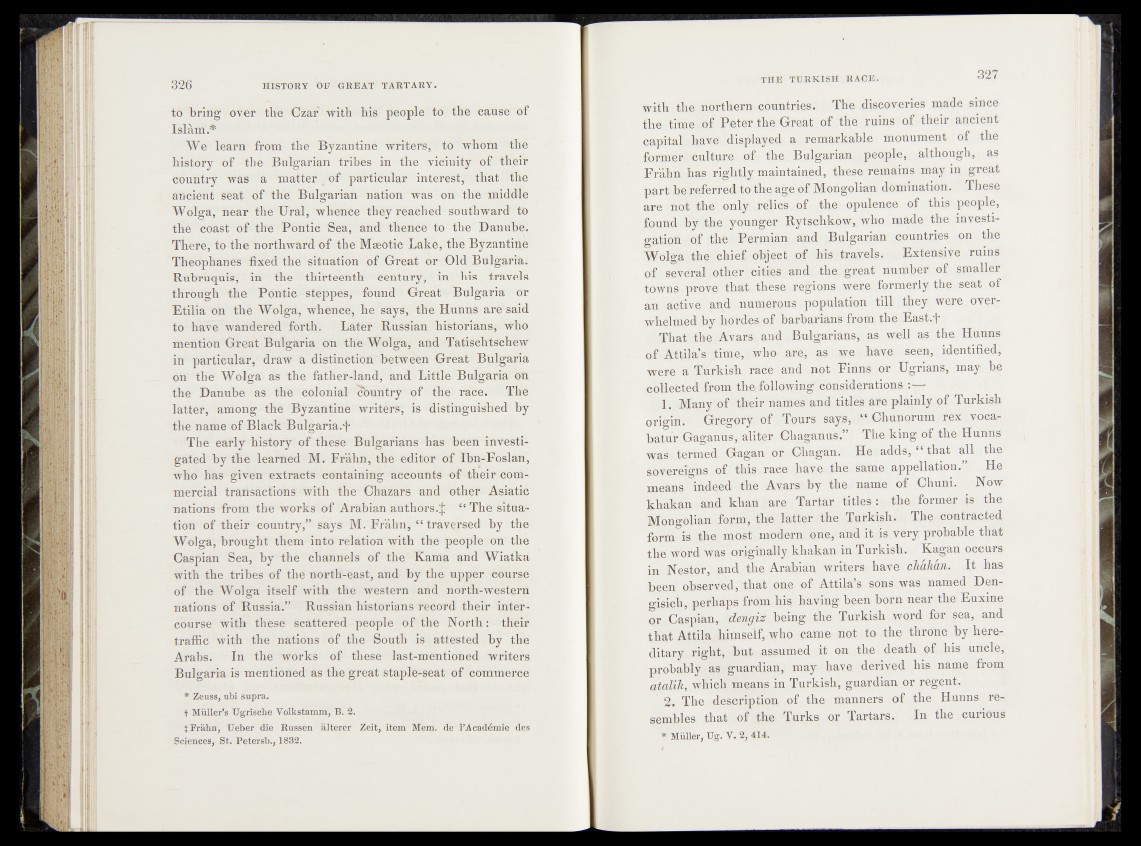
to bring over thé Czar with his people to the cause of
Islàm.*
We learn from the Byzantine writers, to whom the
history of the Bulgarian tribes in the vicinity of their
country was a matter | of particular S/iriterest, that the
ancient seat of the Bulgarian nation was on the middle
Wolga, near the Ural, whence they reached 'southward to
the coast of the Pontic Sea, and thence to the Danube.
There, to the northward of the Mæotie Lake, the Byzantine
Theophanes fixed the situation of Great or Old Bulgaria.
Rubruquis, ' in the thirteenth century, in his travels
through the Pontic steppes, found Great Bulgaria or
Etilia on the Wolga, whence, he says, the Hunns are said
to have wandered forth. Later Russian historians; ; who
mention Great Bulgaria on the Wolga, and Tatischtsche w
in particular, draw a distinction between Great Bulgaria
oil the Wolga as the fatlef4and|t4nd Little Bulgaria oil
the Danube as the colonial country of' the face. T-bê
latter, among the Byzantine writers, is distihgiàfehed^tbyr
the name of Black Bulgaria.^
The early history of these Bulgarians has t/een investigated
by the learned M. Frähn, the editor of Tbn-Foslam,
who has givett~extracts containing ’aCeounS# of tllÄPliom^
mércial transactions with the Cbasfars and other Asiatil
nations from the works of Arabian authors.^ “ The situation
óf their country,” says M. Frähn, “ traversed lay s the
Wolga, brought them into relation with the people: on the
Caspian Sea, by the channels of thé Kama and Wiatka
with the tribes of the north-east, and- by the upper course
of the Wolsra itself with the western and north-western G nations of Russia.” Russian historians record their intercourse
with these scattered people of the North: their
traffic with the nations of the South is attested by the
Arabs. In the works ofi these last-mentioned writers
Bulgaria is mentioned as the great staple-seat of commerce
* Zeuss, ubi supra.
t Muller’s UgriScbe Volk stamm, B. 2.
t Frähn, Ueber die Russen • älterer Zeit, item Mem. de~ l’Académie des
Sciences, St. Petersb., 1832.
with the ^northern- countries. The discoveries made since
the timer of Peter the Great of the ruins of their ancient
capital have^displayed a remarkable monument of the
former culture of the Bulgarian people^;, although, as
Frahp.has rightly maintained, these remains may in great
part jb# referred to$Ji^g-e^%Mengplian domination. These
are n©jt the only reMgs^iof ^ the opulence ,of this people,
ffiua^by :^tt,e^ypunge^ Rytlchkow, wjio made thefiinyesti-
gation of the Permian . and .Bulgarian .countries on the
Wolgar.4 h&. chief object;;of ffistitravels. -Extensive ruins
of s#eral o fS ’i&citj^Ji&cL, th&.giïeat number of fpealler
tfjwns prove that th ese^ ^ i© ^ .were- .formerly the seat of
an. iaetiyffc .and mfme||us ^©pulatiop. till they were overwhelmed
Jay hordes p-f barbarians from thé East.f
That the Ayarsf.and Bulgaria,* as .jjfcell as the Hunns
of rAtbila’sMtime,:|.who are, as ..^ ^ h a^ ^ se en ,-, identified,
Wefe%| Turkish race and notFirihs or Ugrians, may b||
cd^e’eted from the.followin^^Oj^dératioEtö-;^^
1. Many of # .^ n am e fin d it1|iéjes. are plainly, of Turkish
origi-h^r" Gregorys of Tours^say^,V“' Chünorum r'ex^vóe^s'
■^tu^’GaganuS, aliter Ch^ganus,” The^fein^|)f the Hunns
was-.termpd, Gagan or Chagan. He. ad4^,^“ that gBS the
sovereigns of this, race He
means indeed the Avars-by the, name of Chuni. Now
khakani.and khan>are Tartar titles:- the-former4is the,
Mongolian form, the latter the Tn^k^h; , The contracted,
form is the moét modern oney. and i^s£ypi$ probahl? that
the word was originally khakan in Turkish. i'K ^ u r^ c u r s
in Nestor, and the Arabian writers hay'^phakan.. . It has
been observed, that one-of Attila’s sons, was named Den-
gisich, perhaps, from his having-beep born near the.Euxine
qr Caspian,, dengiz^p).ng the Turkish word fpr. isea, and
that Attila himself, who came nq.t j.tp^hfpthrone by hereditary
right, hut^assum^d-it on the.; dqath of his uncle^
probably as guardian, may ..have derived name,-from
atalik, whieh means in Turkish,;guardian or ^e^nt.:,, ,
2. The description of the planners of the Hunps re-,
sembles that óf‘ the Turks or Tartars. In the curious
* Müller, Ug. V. 2, 414.